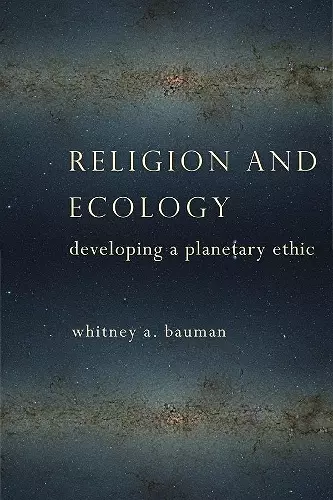Religion and Ecology
Developing a Planetary Ethic
Format:Hardback
Publisher:Columbia University Press
Published:16th May '14
Currently unavailable, and unfortunately no date known when it will be back

Whitney A. Bauman calls attention to the historical, political, and ecological influences shaping our understanding of nature, religion, humanity, and identity. He collapses the boundaries separating male from female, biology from machine, human from more than human, and religion from science, and he encourages readers to embrace hybridity and the inherent fluctuations of an open, evolving global community. As he outlines his planetary ethic, Bauman concurrently develops an environmental ethic of movement that relies on the daily connections we make across the planet. He shows how both identity politics and environmental ethics fail to realize planetary politics and action.
Moving beyond identity politics while continuing to respect diverse entities and concerns, Whitney A. Bauman builds a planetary politics that better responds to the realities of a pluralistic world. Calling attention to the historical, political, and ecological influences shaping our understanding of nature, religion, humanity, and identity, Bauman collapses the boundaries separating male from female, biology from machine, human from more than human, and religion from science, encouraging readers to embrace hybridity and the inherent fluctuations of an open, evolving global community. As he outlines his planetary ethic, Bauman concurrently develops an environmental ethic of movement that relies not on place but on the daily connections we make across the planet. He shows how both identity politics and environmental ethics fail to realize planetary politics and action, limited as they are by foundational modes of thought that create entire worlds out of their own logic. Introducing a postfoundational vision not rooted in the formal principles of "nature" or "God" and not based in the idea of human exceptionalism, Bauman draws on cutting-edge insights from queer, poststructural, and deconstructive theory and makes a major contribution to the study of religion, science, politics, and ecology.
A very impressive book; a visionary synthesis of the most important issues concerning the intersection of science, religion, politics, and philosophy. Bauman weaves a complex and powerful narrative in his constitution of a planetary community. Religion and Ecology is a unique contribution to a growing body of work that critically rethinks our ideas of nature to vitalize the possibilities of material and ecological thinking. -- Clayton Crockett, University of Central Arkansas Scholarship has needed this book for quite a while, one that boldly synthesizes new materialism, queer theory, ecology, and spirituality. -- Tim Morton, Rice University If I could send Obama, Xi Jinping, and Angela Merkel a book (and they would promise to study it), this would be it. These powerful politicians need to understand that their ethical obligations in the twenty-first century will not be toward globalized beings but rather planetary Being, that is, people, animals, and plants who perform their identities rather than submit to them. These are also Beings who know there is no certainty when it comes to performance because, as Bauman says, 'the only certainty is that when certainty is imposed on the world love is impossible and violence is inevitable.' This is a book philosophers, theologians, and scientists will debate for a very long time. -- Santiago Zabala, ICREA Research Professor at the University of Barcelona and coautho,r with Gianni Vattimo, of Hermeneutic Communism Any self-respecting earthling will love this book. Bauman invites us to the 'polyamoury of place' for a new powow of science, religion, and nature. His dazzlingly engaging investigation does not close in our possibilities; deftly subversive, queerly erudite, it does not just analyze, it activates our 'becoming with earth others.' -- Catherine Keller, Drew University Bauman's book [is] the best available book on the subject. -- Andrew J. Spencer Environmental Ethics Because this book brings together so many different perspectives and issues, it is especially helpful for religion scholars and theologians who are not familiar with environmental issues, but it will also be of interest to environmental ethicists and ecotheologians, who will find Bauman's use of queer theory and his critique of bioregionalism both original and constructive. -- Anna Peterson Worldviews: Global Religions, Culture, and Ecology
ISBN: 9780231163422
Dimensions: unknown
Weight: unknown
256 pages